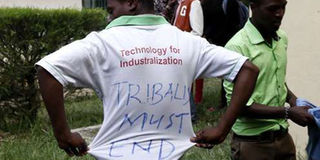Kenya won’t move until it frees itself from yoke of tribalism

Students at the Rift Valley Institute of Science and Technology in Nakuru protest on July 13, 2016. PHOTO | FILE | NATION MEDIA GROUP
What you need to know:
The only problem is that our sharpest brains are extremely thinly spread throughout the country among our myriad of ethnic and racial communities.
The problem with negative tribalism is that it keeps the brainiest and most skilled members of the new nations permanently on the peripheries of policy-making and policy implementation.
In the Wednesday number of the Daily Nation, a Kenyan appropriately called Gachie Baraka published a letter in which he pleaded with Kenya’s political class to spare our country “all further theatrics” because, he warned, only if we graduate from our usual infantile tribe-driven political acrobatics can our country begin to catch up with the rest of the world in development terms.
I say that the name Baraka is appropriate to our theme today because, in Kiswahili and some other Bantu languages, the word Baraka refers to a “blessing”, as a form of it does in most of the Semitic languages from which we have borrowed it. But – as any Christian priest will tell you without batting an eyelid – God helps only those who, in the practical arena, seek to help themselves in this completely ungodly manner.
Yet it depends on what you mean by “self-help”. For self-help is not always a positive idea. In its negativity, there are no better exemplars of “self-help” than the breed of Christians who have recently discovered a cynical new way of fleecing the poorest human beings by preaching “heavenly salvation” to them in the name of a certain Jesus Christ whom the Europeans themselves once crucified with unbelievable cruelty in Palestine.
Indeed, in terms of survival material, Kenyans need a “blessing” as desperately as a young desert plant needs rainwater. Kenya has some of the world’s sharpest brains.
EXPENSIVE SKILLS
The only problem is that our sharpest brains are extremely thinly spread throughout the country among our myriad of ethnic and racial communities.
There, many of the brightest and most skilled Kenyans are so extremely under-used or even dis-used that, though the taxpayers pay them handsomely, they contribute next to nothing to the nation’s mental and economic production and development.
The other problem is what my old friend Koigi wa Wamwere used to call “negative tribalism”.
Why does Koigi use such a term? Doesn’t “negative tribalism” imply “positive tribalism”? Indeed. For negative tribalism refers only to the habit by the leading classes in countries newly independent from European colonialism to favour only members of one’s tribal community whenever one is in a hire-and-fire position.
PUBLIC FINANCES
The problem with such tribalism – especially in the allocation of key jobs, both in administration and in the economy – is that it keeps the brainiest and most skilled members of the new nations permanently on the peripheries of policy-making and policy implementation.
One consequence is that it keeps us permanently in need of ruinously expensive skills from Western Europe and North America.
The leaders of practically all Third World countries make some very inappropriate policies, often designed to help them to siphon off the public’s finances into their own bank accounts and their own pockets, policies which they then proceed to implement only in the most haphazard and nationally most ruinous manner.
SKILLED CLASS
Not only does tribalism keep the brainiest and most skilled Kenyans on the peripheries of policy-making and policy-implementation, it also discourages all members of our best educated and most skilled class from seeking to serve the nation where they are most needed and with anything like enough dedication and self-sacrifice.
We educate a whole cadre extremely expensively only for the private sector – a sector composed only of foreign interests – to snatch them from us by offering them terms and remunerations that are only a tad better.




